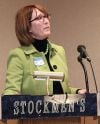The event concluded Saturday with two guest speakers: Nevada Mining Association President Dana Bennett and U.S. Rep. Mark Amodei, R-Nev.
National WIM President Darlene Bray said the purpose of the annual event is to bring all the members together and revitalize the group’s common goals. “We’re bringing new chapters up to speed on our mission statement and our goal,” she said. Bray said the members had a “fabulous time” in Elko.
The group also determined there was room for improvement, she said. “We need to modernize with the time,” Bray said. “We need to come up with new ideas and new ways with the swing of new technology. … We would like to get more people involved in educating their communities about mining. Mining is our bread and butter, and educating the community on mining helps keep the industry strong. People don’t understand where things come from. If you don’t have mining, you won’t have the things you take for granted.”
The luncheon guest speaker, Bennett, also touched on this theme. “I talk about mining with people who don’t necessarily understand it,” Bennett said.
She said about 70 percent of Nevada’s Legislature comes from the Las Vegas area and many of them are new to Nevada. She said the majority of them do not understand the industry and how important it is to the state. “Nevada produces essential minerals,” Bennett said. “We produce 20 minerals, about 14 percent of the nation’s stockpile essentially, and while we are known for gold and silver, there is a lot of industrial mining here as well. We produce industrial minerals.”
She said her favorite was diatomaceous earth, which is used to filter wine and beer. A mine in California, which is near the Nevada border, mines rare earth elements. Bennett said some geologists believe more rare earth elements can be found in Nevada. “These are incredibly important for national defense,” Bennett said. “… And for stuff we use on a daily basis. It’s fun to talk to Nevada legislators about the way mining affects them. Their phone would not vibrate if they didn’t have the rare earth elements out of the Molycorp mine.”
At the end of her speech Bennett asked the group what the industry could do to get more women to apply for jobs on mine sites. She said in Nevada, women make up 5 percent of haul truck drivers, but in Australia women are one-third.
The group consensus seemed to be that in some companies, management’s mindset about female equipment operators needed to be change and women in general needed to be educated more on the opportunities that are available to them.
Several of the attendees said when a job opens up for an equipment operator, they will receive 50 or 100 applications, but not one will be from a woman. Other attendees said they have seen women passed over for promotions on site for male employees who weren’t as qualified. However, everyone agreed it came down to educating everyone that mine sites can employee men and women equally.
During the closing dinner, Amodei was the guest speaker.
Amodei said he has done what he can to make sure permitting moves smoothly between government agencies and the mining industry, but he said there is still room for improvement. He said he was glad Newmont Mining Corp.’s Long Canyon project received its approval.
He said he would like to see more opportunities like Long Canyon and other mines in communities because of the benefits those jobs provide. Amodei said miners are better paid than most other employees. They can afford to buy homes and pay for health care, vehicles and other items. “You add all this up, this is the best industry to have in your communities by a factor of three to the next closest one,” Amodei said.
He said the mining industry does things for its employees that the state and federal government struggle with, such as helping people with health care, housing and food. “This is intuitive common sense,” he said. “You want these industries in your communities, in your counties and in your state. … At any point in time if there’s ever anything I can do for the organization or the industry, if you’re not asking, it’s your fault, and that’s not because I’m your pal, it’s because of what you guys and gals do every day.”
One attendee asked Amodei if he would be running for U.S. Senate. He immediately said “no.” He said he enjoys being in Nevada and likes representing the state two years at a time. “The work is important but the culture sucks,” Amodei said. “The worst thing that could happen is if you ran and you won, you have just committed to staying in Washington, D.C., for six years.” He said Nevada is home and if he ran for a statewide office it would be for one with an office in Carson City, not Washington.
Rhonda Zuraff from Newmont asked Amodei if it would be beneficial to discuss the lessons learned from projects such as Long Canyon, for future projects in the industry. “We’d be happy to sit down with the team, and say OK what were the successes and what were the frustrations,” Amodei said. He said Congress needs to do more oversight on federal agencies. However, oversight is only as good as the information provided, he said. “It is my opinion we as members of Congress in the West have not done a great job of educating our colleagues on the West,” he said. Mining is one of those issues, but it doesn’t end at the state borders, he said. He said the mineral industry across the country needs to come together.




